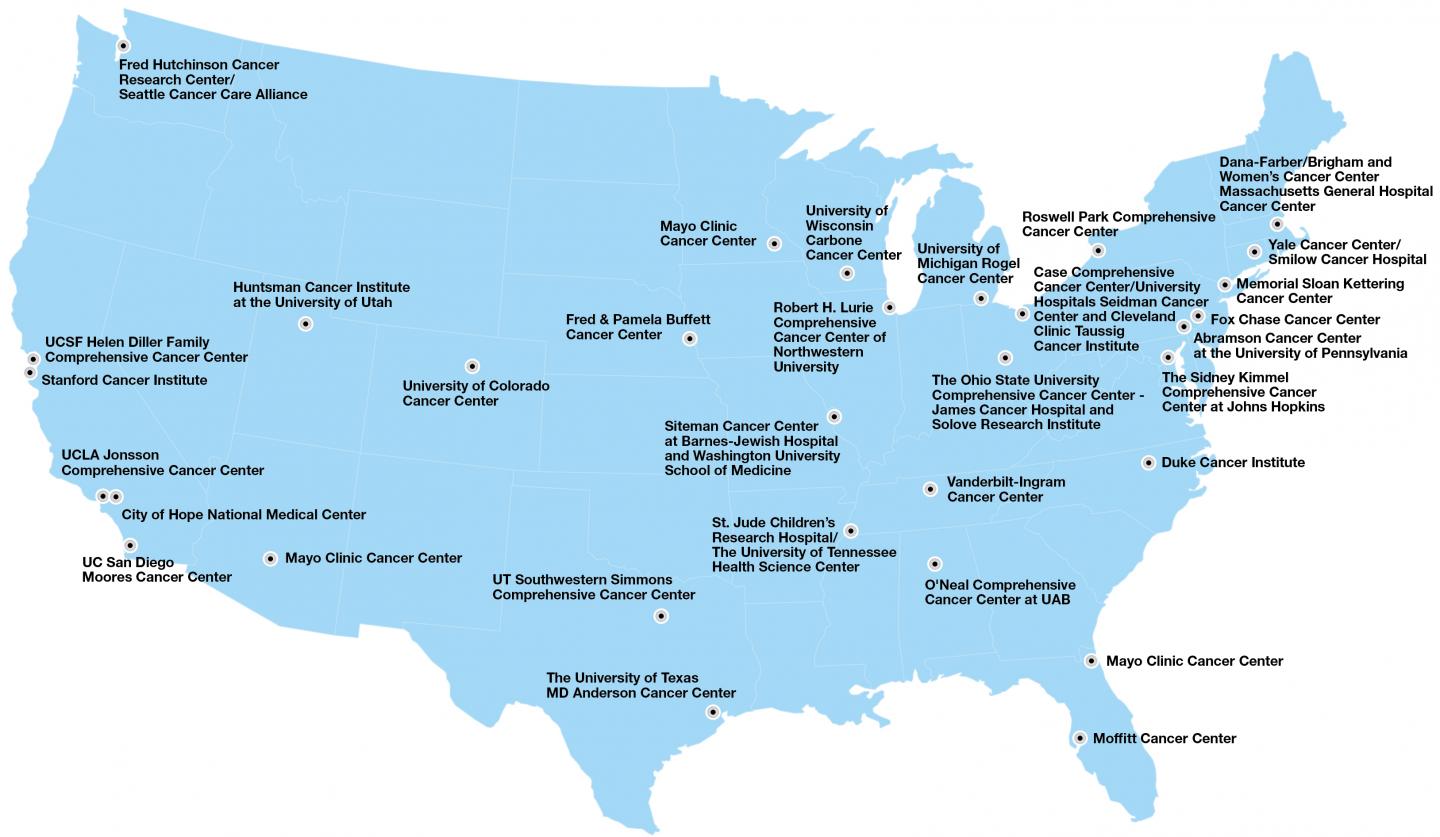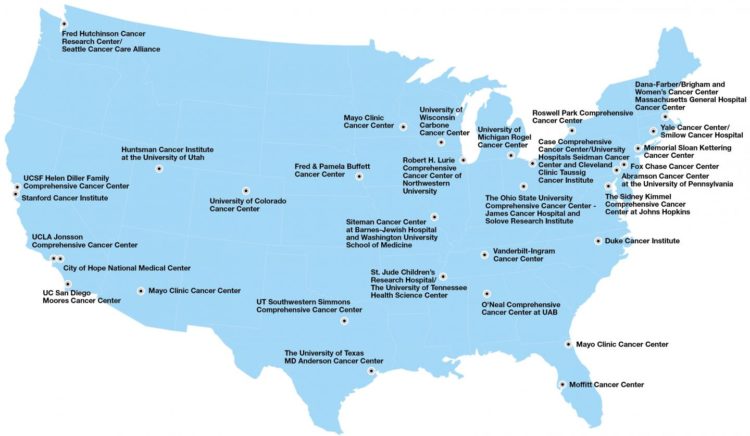Los Angeles- and Dallas-based cancer centers join alliance of leading medical institutions that create guidelines which define optimal cancer management in the US and globally

Credit: NCCN
PLYMOUTH MEETING, PA [March 24, 2020] — The National Comprehensive Cancer Network® (NCCN®) is now an alliance of 30 leading cancer centers, with the addition of two new Member Institutions: UCLA Jonsson Comprehensive Cancer Center and UT Southwestern Simmons Comprehensive Cancer Center (SCCC). These top-tier academic cancer centers are located in two of the most-populous cities in the United States, Los Angeles and Dallas, respectively, and serve large, diverse groups of patients. Both centers have a strong commitment for advancing innovative research that improves cancer care and reduces disparities. Experts from both centers will now be involved in the creation of the NCCN Clinical Practice Guidelines in Oncology (NCCN Guidelines®)–the recognized standard for clinical direction in cancer care and the most thorough and frequently-updated clinical practice guidelines available in any area of medicine.
“We are very excited to incorporate the significant medical and scientific expertise from both UCLA Jonsson Comprehensive Cancer Center and UT Southwestern Simmons Comprehensive Cancer Center into our network of top academic cancer centers,” said Robert W. Carlson, MD, Chief Executive Officer, NCCN. “Both have proven track records when it comes to improving outcomes and quality-of-life for people with cancer. Their facilities include top-notch programs throughout the spectrum of cancer management, including pediatric oncology, genetics, immunotherapy, telemedicine, and other increasingly-important areas of interest for NCCN and the greater cancer care community. They serve diverse, growing populations with strong immigrant representation at a time when the global need for NCCN Guidelines is higher than ever. The multi-disciplinary experts at UCLA and Simmons are among the best in the world, and both centers are ranked very highly by U.S. News & World Report. We are happy to have them work with us to improve and facilitate quality, effective, efficient, and accessible cancer care so patients can live better lives.”
“We are honored and thrilled to become a member of the National Comprehensive Cancer Network,” said Michael Teitell, MD, PhD, Director, UCLA Jonsson Comprehensive Cancer Center. “We look forward to joining our peer institutions and bringing our focus on cutting-edge research and top-quality cancer care to this association of the nation’s top cancer centers.”
“We are excited to be able to join forces with the other leading cancer centers who are part of NCCN,” said John Sweetenham, MD, Associate Director of Clinical Affairs, UT Southwestern Simmons Comprehensive Cancer Center. “Working with the other Member Institutions, we will ensure that the best possible evidence-based cancer care is available to patients throughout the nation and beyond. Our membership will bring the combined expertise of 30 elite cancer centers to the people of North Texas.” Carlos L. Arteaga, MD, Director of the Simmons Cancer Center, echoed Dr. Sweetenham by adding “membership of the NCCN will greatly enhance our ability to apply the most recent cancer discoveries to our patient care mission.”
In 2019 alone, more than 1,500 experts from NCCN Member Institutions contributed a combined 35,000+ hours to create and update NCCN Guidelines. Those guidelines provide the latest evidence- and expert consensus-based recommendations applying to 97 percent of cancers affecting patients in the United States, and also include prevention, screening, and supportive care topics. The development of the NCCN Guidelines is solely supported by membership dues from the NCCN Member Institutions.
###
The announcement of the addition of the UCLA Jonsson Comprehensive Cancer Center and UT Southwestern Simmons Comprehensive Cancer Center comes as NCCN celebrates its 25th anniversary year. The non-profit organization consisted of 13 centers when it was first founded in 1995.
In addition to joining the panels behind the NCCN Guidelines and their derivatives, experts from UCLA and SCCC will work with NCCN to provide continuing education; policy and advocacy outreach; best practices information; organization of clinical trials and research; global adaptations and translations; and up-to-date patient information. Visit NCCN.org to learn more about the various programs and their role in improving cancer care worldwide.
About the National Comprehensive Cancer Network
The National Comprehensive Cancer Network® (NCCN®) is a not-for-profit alliance of 30 leading cancer centers devoted to patient care, research, and education. NCCN is dedicated to improving and facilitating quality, effective, efficient, and accessible cancer care so patients can live better lives. Through the leadership and expertise of clinical professionals at NCCN Member Institutions, NCCN develops resources that present valuable information to the numerous stakeholders in the health care delivery system. By defining and advancing high-quality cancer care, NCCN promotes the importance of continuous quality improvement and recognizes the significance of creating clinical practice guidelines appropriate for use by patients, clinicians, and other health care decision-makers around the world.
The NCCN Member Institutions are: Abramson Cancer Center at the University of Pennsylvania, Philadelphia, PA; Fred & Pamela Buffett Cancer Center, Omaha, NE; Case Comprehensive Cancer Center/University Hospitals Seidman Cancer Center and Cleveland Clinic Taussig Cancer Institute, Cleveland, OH; City of Hope National Medical Center, Duarte, CA; Dana-Farber/Brigham and Women’s Cancer Center | Massachusetts General Hospital Cancer Center, Boston, MA; Duke Cancer Institute, Durham, NC; Fox Chase Cancer Center, Philadelphia, PA; Huntsman Cancer Institute at the University of Utah, Salt Lake City, UT; Fred Hutchinson Cancer Research Center/Seattle Cancer Care Alliance, Seattle, WA; The Sidney Kimmel Comprehensive Cancer Center at Johns Hopkins, Baltimore, MD; Robert H. Lurie Comprehensive Cancer Center of Northwestern University, Chicago, IL; Mayo Clinic Cancer Center, Phoenix/Scottsdale, AZ, Jacksonville, FL, and Rochester, MN; Memorial Sloan Kettering Cancer Center, New York, NY; Moffitt Cancer Center, Tampa, FL; The Ohio State University Comprehensive Cancer Center – James Cancer Hospital and Solove Research Institute, Columbus, OH; O’Neal Comprehensive Cancer Center at UAB, Birmingham, AL; Roswell Park Comprehensive Cancer Center, Buffalo, NY; Siteman Cancer Center at Barnes-Jewish Hospital and Washington University School of Medicine, St. Louis, MO; St. Jude Children’s Research Hospital/The University of Tennessee Health Science Center, Memphis, TN; Stanford Cancer Institute, Stanford, CA; UC San Diego Moores Cancer Center, La Jolla, CA; UCLA Jonsson Comprehensive Cancer Center, Los Angeles, CA; UCSF Helen Diller Family Comprehensive Cancer Center, San Francisco, CA; University of Colorado Cancer Center, Aurora, CO; University of Michigan Rogel Cancer Center, Ann Arbor, MI; The University of Texas MD Anderson Cancer Center, Houston, TX; University of Wisconsin Carbone Cancer Center, Madison, WI; UT Southwestern Simmons Comprehensive Cancer Center, Dallas, TX; Vanderbilt-Ingram Cancer Center, Nashville, TN; and Yale Cancer Center/Smilow Cancer Hospital, New Haven, CT.
Clinicians, visit NCCN.org. Patients and caregivers, visit NCCN.org/patients. Media, visit NCCN.org/news. Follow NCCN on Twitter @NCCN, Facebook @NCCNorg, and Instagram @NCCNorg.
Media Contact
Rachel Darwin
[email protected]
267-622-6624
Original Source
http://www.





